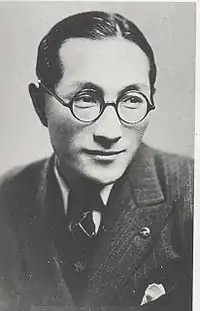Bin Uehara
Bin Uehara (上原 敏, Uehara Bin, August 26, 1908 – July 29, 1944) was a Japanese music (ryūkōka) singer and soldier. He was known for using naniwa-bushi's kobushi vocalism in Japanese popular music. He was killed in action during the eastern New Guinea campaign during the Pacific War.[1][2]
Bin Uehara | |
|---|---|
 | |
| Background information | |
| Birth name | Rikiji Matsumoto |
| Born | August 26, 1908 Akita Prefecture, Japan |
| Died | July 29, 1944 (aged 35) New Guinea |
| Genres | Ryūkōka |
| Occupation(s) | Singer |
| Years active | 1936–1943 |
Life
Uehara was born as Rikiji Matsumoto in Ōdate, Akita Prefecture, Japan.[2] He graduated from Senshu University, and made his professional debut with the song "Tsukimi Odori" (月見踊り, lit. "Moon-viewing Dance") under the Japanese division of Polydor Records in 1936.[2] His famous songs included the 1937 song "Ruten" (流転, lit. "Stream-rolling"). His vocal style, called kobushi, became popular as the more emphatic form among modern enka singers.[3]
Uehara became a soldier in 1943, went to New Guinea, and was killed in battle on July 29, 1944.[4]
Legacy
In 1976, a monument honoring him was established in his home city of Ōdate.[5]
Discography
- Tsumagoi Dōchū (妻恋道中, In the Way of Wife-love) : 1937
- Ruten (流転, Stream-rolling) : 1937
- Shanghai Dayori (上海だより, Shanghai Letter) : 1938
- Iroha Jingi (いろは仁義, Iroha Benevolence And Righteousness) : 1938
- Nankin Dayori (南京だより, Nanjing Letter) : 1938
- Hokuman Dayori (北満だより, North Manchu Letter) : 1938
- Butaichō to Heitai (部隊長と兵隊, Unit Commander and Soldier) : 1938 with Taro Shoji
- Ore wa Funanori (俺は船乗り, I am a Sailor) : 1939
- Otoko Funanori (男船乗り, Male Sailor) : 1939
- Butsuin Dayori (佛印だより, French Indochina Letter) : 1941
References
| Wikimedia Commons has media related to Bin Uehara. |
- 名歌手たち、それぞれの終戦 (in Japanese). JANJAN. October 5, 2006. Archived from the original on September 28, 2008. Retrieved April 11, 2009.
- "上原敏" [Uehara Bin]. Nihon Jinmei Daijiten (日本人名大辞典) (in Japanese). Tokyo: Shogakukan. 2012. Archived from the original on August 25, 2007. Retrieved July 2, 2012.
- "Special 2. Japanese popular music (4)" (in Japanese). Toshiba. November 2006. Archived from the original on June 19, 2008. Retrieved April 11, 2009.
- "Bin Uehara" (in Japanese). Ōdate City. Archived from the original on October 30, 2007. Retrieved April 11, 2009.
- ジャングルの鎮魂歌 ~上原敏と戦後~ (in Japanese). Fuji Television. September 18, 2000. Retrieved May 30, 2009.
